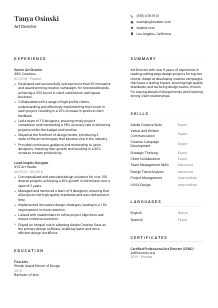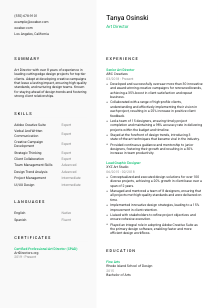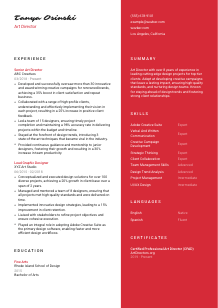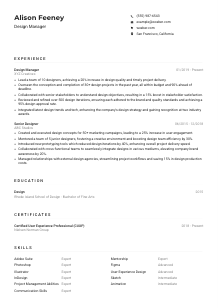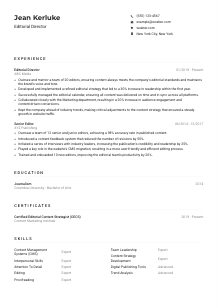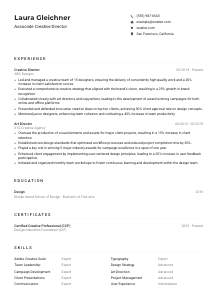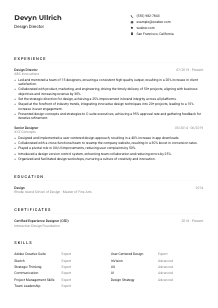Art Director Resume Example
Masterminding visual brilliance, but your resume feels like it's in need of an artistic touch? Dive into this Art Director resume example, sculpted with Wozber free resume builder. Witness how you can seamlessly present your creative leadership to align with job criteria, crafting a career narrative as captivating as your portfolio!
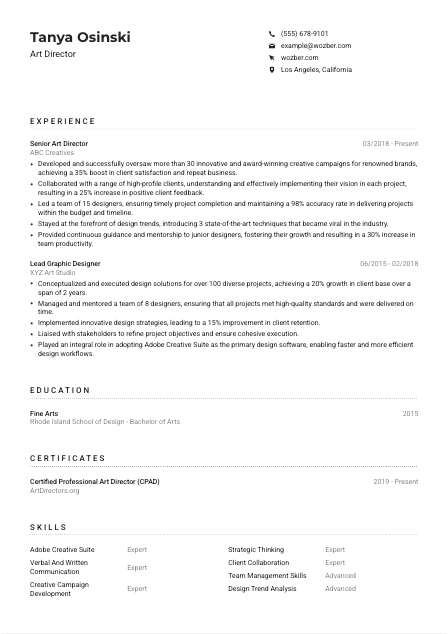
How to write an Art Director Resume?
Greetings, visionary Art Director in the making! As the creative world continues to evolve, standing out in a sea of talent becomes crucial. Your resume is not just a document; it's an exhibit of your artistic journey, your masterpieces, and your ability to lead with innovation.
With a touch of creativity and strategic structuring using the Wozber free resume builder, we shall transform your resume into a captivating narrative that aligns seamlessly with your dream role. Embark on this creative voyage to tailor your resume, ensuring it's not only ATS-compliant but a true reflection of your creative acumen.
Personal Details
First impressions in the art world are everything, and your resume's Personal Details section is the grand entrance to your career exhibit. In the realm of Art Directors, where creativity meets leadership, let's finesse this section to not only introduce you but also intrigue.
1. Embrace Your Brand
Think of your name on the resume as the title of your most acclaimed piece. Make sure it's presented in a font that's sophisticated yet readable, possibly reflecting your personal brand or style. This is the spotlight on your canvas.
2. Role Titling
"Art Director" - this title, aligned beneath your name, signals to the hiring manager your desired role, matching it perfectly with the job description. It acts as your profession's statement of intent, framing you as the ideal protagonist for the role.
3. Communication Channels
Include your contact number and a professional email address that is like your digital business card – simple, professional, and without embellishments. Ensuring these details are typo-free is akin to perfecting the finer details on a masterpiece.
4. Geographic Harmony
Given the role's location in Los Angeles, California, prominently displaying your location ensures a smooth canvas for relocation discussions, if any. It subtly affirms your availability and readiness, easing logistic concerns.
5. Digital Portfolios
In a profession where visuals speak volumes, including a link to your professional profile or personal portfolio website becomes indispensable. It's like offering a personal gallery tour, allowing your work to complement the narrative your resume begins.
Takeaway
The Personal Details section is your resume's initial handshake - professional, yet revealing enough to invite further exploration. Tailor it with precision to ensure it lays the groundwork for the story you're about to unfold. Remember, you're not just listing information; you're inviting the hiring manager into your professional world.





Experience
In the domain of Art Direction, your experience section is your portfolio in prose. Here, your leadership, vision, and impact take center stage. Let's dive into portraying your creative saga with finesity, making every role and project count.
- Developed and successfully oversaw more than 30 innovative and award‑winning creative campaigns for renowned brands, achieving a 35% boost in client satisfaction and repeat business.
- Collaborated with a range of high‑profile clients, understanding and effectively implementing their vision in each project, resulting in a 25% increase in positive client feedback.
- Led a team of 15 designers, ensuring timely project completion and maintaining a 98% accuracy rate in delivering projects within the budget and timeline.
- Stayed at the forefront of design trends, introducing 3 state‑of‑the‑art techniques that became viral in the industry.
- Provided continuous guidance and mentorship to junior designers, fostering their growth and resulting in a 30% increase in team productivity.
- Conceptualized and executed design solutions for over 100 diverse projects, achieving a 20% growth in client base over a span of 2 years.
- Managed and mentored a team of 8 designers, ensuring that all projects met high‑quality standards and were delivered on time.
- Implemented innovative design strategies, leading to a 15% improvement in client retention.
- Liaised with stakeholders to refine project objectives and ensure cohesive execution.
- Played an integral role in adopting Adobe Creative Suite as the primary design software, enabling faster and more efficient design workflows.
1. Dissect the Role
Begin with a surgical analysis of the job requirements. For instance, the role emphasizes leadership in creative campaigns and collaboration with clients - your experience should narrate instances where you've shone in these areas.
2. Chronological Storytelling
Arrange your roles chronologically, leading with your most recent position. Each role should unveil a chapter of your evolution, highlighting your growth in creativity and leadership within design-centric environments.
3. Action-driven Narratives
Frame your achievements in active, vivid language. Detailing how you developed and led creative campaigns or nurtured design talent showcases not just your skills, but your impact and the value you bring to the table.
4. Celebrate the Numbers
Quantitative achievements, like a "35% boost in client satisfaction", make your contributions tangible and relatable. They paint a picture of success, lending credibility and color to your professional story.
5. Relevancy is Key
Every anecdote and achievement listed should reflect your qualifications for the Art Director role. Like curating an exhibit, display only the most relevant and impressive pieces of your career journey.
Takeaway
The Experience section is where your professional saga unfolds. Here, numbers meet narratives, showcasing not only what you've done but how you've left the art world richer for it. Each line you craft is an opportunity to illustrate your unique blend of vision and execution. Make them count!
Education
In the world of art direction, your education tells the story of your creative inception, your journey through the realms of theory and technique. Let's craft this section to not just list your academic credentials, but to resonate with the cornerstone of your expertise.
1. Degree Specification
Pinpointing the educational requirements of the job description, in this case, a "Bachelor's degree in Fine Arts, Graphic Design, or related field", ensures your resume speaks directly to the prerequisites, positioning you as a fitting candidate.
2. Clarity and Structure
Present your academic history clearly and concisely. Each institution attended becomes a stroke in the broader picture of your academic pilgrimage, contributing to the professional you are today.
3. Align Degree Details
"Bachelor of Arts in Fine Arts" not only matches the job's requirements but also underlines your specialized foundation in the field, resonating with the depth and breadth of knowledge expected of an Art Director.
4. Coursework and Projects
While a comprehensive list of courses or projects might not be necessary for all, highlighting particularly relevant or standout academic experiences can add depth to your educational background, painting a fuller picture of your capabilities.
5. Extracurricular Accolades
Noteworthy academic achievements or involvement in art and design clubs can be the embellishments that make your education section stand out, showcasing your commitment and passion for the field beyond the classroom.
Takeaway
Your Education section isn't just a list; it's the backstory to your career masterpiece, tracing your journey from foundational knowledge to professional excellence. Craft it to reflect not just where you've studied, but how your education has shaped your artistic and leadership vision.
Certificates
In the evolving field of art direction, certifications serve as milestones of your commitment to growth and professional excellence. They are badges of honor, evidencing your expertise and dedication.
1. Essence of the Role
Initiate by revisiting the job posting's demand matrix. Though the Art Director role may not explicitly require certifications, possessing and listing relevant ones, like "Certified Professional Art Director (CPAD)", subtly elevates your profile.
2. Precision in Selection
A discerning, quality-over-quantity approach to listing certifications ensures that each one showcased is in perfect alignment with the job requirements, enhancing your resume's relevance and appeal.
3. Date and Relevance
Adding the acquisition date of each certificate, where applicable, lends freshness and continued relevance to your qualifications, indicating an ongoing engagement with your professional development.
4. Continuous Learning
The creative industry thrives on innovation and change. Staying ahead by pursuing further certifications and learning opportunities not only bolsters your resume but signals your commitment to evolving with the industry.
Takeaway
Your certifications are not mere accolades but reflections of your journey in the art world. They underscore your expertise, learning, and the ongoing pursuit of excellence. Keep collecting these badges, each a beacon of your dedication to the craft and leadership in the creative domain.
Skills
The Skills section of your resume is a curated gallery of your capabilities, a showcase of the tools and traits that make you the ideal candidate for the Art Director role. Let's sculpt this section to reflect a balance of technical proficiency and visionary leadership.
1. Decipher the Blueprint
Begin by mining the job description for both explicit and implicit skills required. For an Art Director, mastery in "Adobe Creative Suite" and prowess in "Strategic Thinking" are non-negotiables, serving as the foundation for your professional skill set.
2. Tailor Your Toolkit
Equipping your resume with skills that mirror the job description not only proves your capabilities but also aligns your professional toolkit with the exact requirements of the role, crafting a compelling argument in your favor.
3. Curate with Care
While you might possess a vast array of skills, the spotlight should only illuminate those most pertinent to the Art Director role. Think of this section as your exhibit—only the most impactful pieces belong.
Takeaway
Treat the Skills section as your palette, each skill a color with which you paint your professional landscape. Select and showcase these with the same care and intentionality you would in your art, ensuring each one contributes to a holistic and compelling professional portrait.
Languages
In the global village of today's creative industries, linguistic prowess can amplify your ability to communicate, collaborate, and innovate. Here's how you can paint your language skills in a way that widens your horizon and showcases your global mindset.
1. Job Requirements Analysis
Revisit the job description to identify any specific language requirements. For example, "High proficiency in English necessary" underlines the non-negotiable skill of fluent communication in the corporate lingua franca.
2. Feature Essential Languages
Highlight your proficiency in languages listed in the job description at the top, ensuring the hiring manager immediately sees your linguistic capabilities aligned with the job requirements.
3. Showcase Additional Languages
Your ability to converse in multiple languages, like being "Fluent in Spanish", demonstrates cultural versatility and can be an asset in roles involving cross-cultural teams or international clients.
4. Honest Proficiency Grading
Use clear, universally understood levels of language proficiency. Being transparent about your fluency levels sets accurate expectations and showcases your integrity.
5. Understanding the Role's Ambit
Appreciate the role's scope within a global or multicultural context. Your linguistic abilities can significantly elevate your profile if the position has an international dimension or involves diverse teams.
Takeaway
Think of each language you speak as a brushstroke on the canvas of your career. Together, they create a picture of a globally competent, culturally versatile professional ready to lead and inspire in a connected world. Your command of languages is a testament to your capacity to engage, understand, and innovate on a global stage.
Summary
Your summary is a snapshot of your professional identity, a chance to capture the hiring manager's imagination and interest from the get-go. Let's compose a summary that articulates your essence as an Art Director, setting the tone for your resume.
1. Capture the Role's Spirit
Absorb the essence of what makes an outstanding Art Director – a visionary with an eye for the new, a leader of the creative procession, and a communicator of ideas. Your opening statement should breathe this essence.
2. Bold Introduction
Begin with a strong, engaging introduction that paints you as a seasoned Art Director ready to harness creativity and innovation, drawing the hiring manager into your world of artistic leadership.
3. Align with Expectations
Weave into your summary the core skills and significant achievements that speak directly to the job description, like "developing creative campaigns" or "fostering team productivity". This alignment suggests you're not just any candidate, but the candidate.
4. Brevity with Impact
Conciseness is key. Your summary is the teaser, not the feature film. In 3-5 impactful lines, invite the reader into the narrative of your professional journey, promising them a story worth exploring further.
Takeaway
Consider your summary the masterstroke on your resume canvas - concise yet compelling, capturing the essence of your candidacy. It sets the stage for the detailed narrative that follows, ensuring the hiring manager is captivated enough to continue. As the prelude to your professional saga, make sure it resonates with the role you aspire to embody.
Embarking on Your Art Director Voyage
As you put the finishing touches on your resume, remember that it's more than a document - it's a curated collection of your career highlights, designed not just to inform but to inspire. With these insights and the help of the Wozber free resume builder, creating an ATS-compliant resume that reflects your unique journey and vision as an Art Director has never been easier. From ATS-friendly resume templates to the precision of the ATS resume scanner for keyword optimization, every tool is designed to elevate your candidacy. Let your resume be the canvas where your professional story comes to life, inviting the world to witness your creativity, leadership, and vision.
Your next masterpiece awaits. Forge ahead and make your mark!

- Bachelor's degree in Fine Arts, Graphic Design, or related field.
- Minimum of 5 years of experience in a design or creative agency setting.
- Proficient in design software such as Adobe Creative Suite.
- Strong leadership and team management skills.
- Excellent verbal and written communication abilities.
- High proficiency in English necessary.
- Must be located in Los Angeles, California.
- Develop and oversee creative campaigns for various projects and clients.
- Collaborate closely with clients and account teams to understand and implement their vision.
- Lead and manage a team of designers, ensuring high-quality standards are met.
- Stay updated with the latest design trends, tools, and techniques.
- Provide guidance and feedback to team members, fostering their professional growth.





